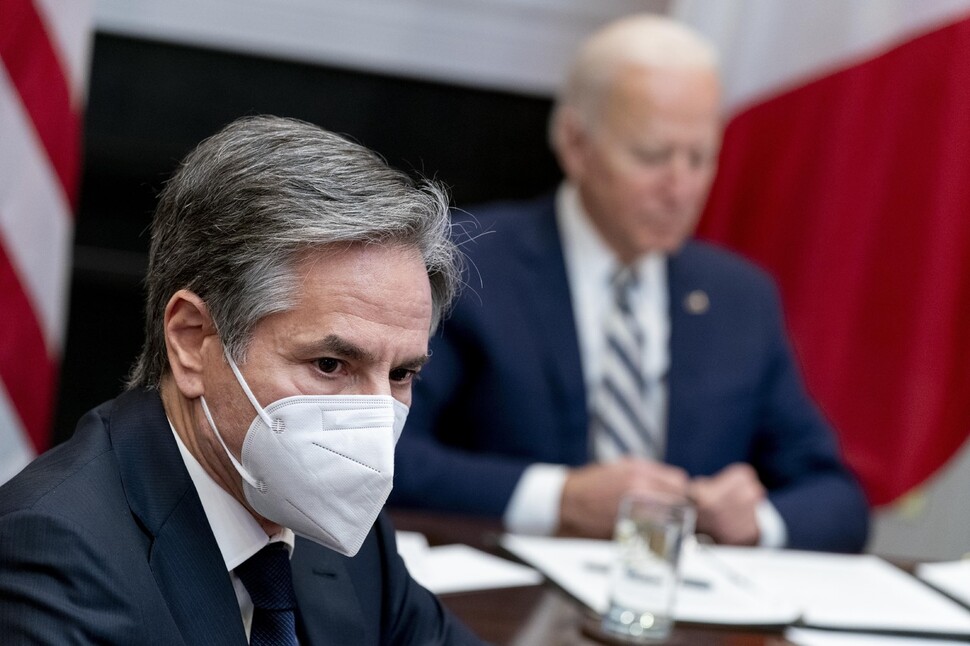Plan to establish North Korea policy within the US order
Korean government “share information in advance with the US”
“Biden policy toward North Korea, it will not be filled with North Korea”

Secretary of State Tony Blincoln is watching US President Joe Biden’s video conference with Mexican President Lopez Obrador at the White House in Washington on the 1st. Washington/AP Yonhap News
Joe Biden’s US administration has tried to contact North Korea through various channels since mid-February, but media reports that North Korea is not responding. It is revealed that North Korea is “silent” in an important phase where the US policy reexamination toward North Korea ends in the coming weeks, and Secretary of State Tony Blincoln and Secretary of Defense Lloyd Austin Time) The meaning of the tour between Korea and Japan has become greater than before. A senior US government official, who requested anonymity, told a communication on the 13th that there were attempts to contact the North Korean regime “through various channels including New York starting in mid-February,” but “so far, we have not received any response from Pyongyang.” In the process of reviewing North Korea policy, the Biden administration, which was launched on January 20, tried to find out the exact intentions related to’denuclearization’ by contacting the North Korean side through various channels, including the North Korean Representative to the United Nations in New York, but did not get any results. Means. The official said there appeared to be no active dialogue between North Korea and the United States “despite several attempts by the United States” over the past year, including at the end of the former administration of Donald Trump. The Biden administration, which has placed a top priority on China’s checks in foreign policy, has criticized North Korea’s nuclear and ballistic missile threats as an example to the question, “Is the North Korean issue subordinate?” and has revealed that “North Korea is a priority issue”. North Korea has been asking the US for a’new calculation method’ that they can understand after the’Hanoi collapse’ at the end of February 2019. Since then, after responding to a working-level negotiation held in Stockholm in October 2019, he has avoided official contact with the United States. The present silence can be presumed to be a’fight’ peculiar to North Korea with the North Korean-US negotiations in the future. An official from the Ministry of Foreign Affairs said that the information was “shared in advance from the United States.” It turns out that North Korea is silent about any attempts made by the United States to contact the United States, and the importance of the visits between Secretary of State Blincoln and Secretary of Defense Austin, scheduled for the 16th and 18th, between Korea and Japan increased. This is because, in the absence of direct communication with North Korea, the direction of policy toward North Korea must be determined by gathering the opinions of major allies such as South Korea and Japan. In the meantime, the Biden administration has revealed its intention to negotiate policy with Korea, the’party’ of the denuclearization of the Korean peninsula, and Japan, the’important country’, in the process of reviewing its policy toward North Korea. This work will be done through diplomatic and defense (2+2) ministerial meetings held in Japan (16-17) and Korea (17-18) respectively. In a telephone briefing with reporters on the 12th, Mr. Sung Kim, Assistant Secretary of State for East Asia and Pacific, said, “(Minister Blincoln’s visit to Korea and Japan) will allow our allies to provide high-level opinions in our (policy review) process. “It’s going to be another big opportunity for us,” he said. “We’re working quickly, so maybe we’ll be able to complete the review within a few weeks.” There are two main variables related to this. The first is the attitude of the United States. “It is important whether the United States is coming to inform South Korea of their review, or to consult,” said Gab-woo Koo, a professor at North Korea Graduate University. The second is the deep “time difference” between the two US allies, South Korea and Japan. Starting with the 6·12’Singapore Joint Declaration’, a legacy of the former Trump administration, the positions of South Korea and Japan, which insist on a comprehensive solution to the nuclear, missile (all ranges), and abduction issues, are very different from that of reactivating the’peace process on the Korean Peninsula’ In the meantime, considerable pain is expected in coordinating opinions. Regarding the results of the review, the former head of the Korean Peninsula Peace Bargaining Headquarters, who was in charge of the North Korean nuclear negotiations, said, “The Biden administration officials are experienced people who know the North Korean nuclear issue. It is difficult for a new story to come out suddenly. It is expected that a conclusion will be drawn, such as’promoting denuclearization step by step and gradual using pressure and sanctions and multilateral linkage.’ He continued, he feared the possibility of provocation, saying that this conclusion “will not be filled with the sex of the North, which has already experienced three North Korea-US summits and has tasted great achievements in Singapore.” Another key issue is how strongly the US will demand South Korea’s participation in the’Quad Plus’, which expands the’Quad’, a security council, which is the core of the public siege policy. Jo Sung-ryul, an advisory research fellow at the National Security Strategy Research Institute, predicted, “It is true that this is a very embarrassing problem from the standpoint of South Korea.” On the other hand, former Ambassador Satellite Rak said, “The main purpose of this trip to Korea and Japan is to check China (not to coordinate policy toward North Korea). bad. I hope that we do not argue too much about our notions against the United States and present a realistic and cool alternative.” By correspondent in Washington/Hwang Jun-beom, and Gil Yoon-hyung, staff reporter [email protected]
